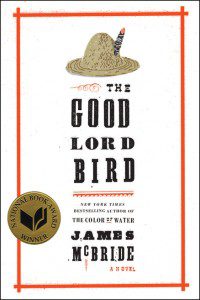My series on visions will resume in a few weeks. In the meantime, it’s worth noting that a film involving a young boy’s near-death vision of heaven and Jesus has become an unexpected hit.
Right now, however, I’ve just finished reading The Good Lord Bird, last year’s National Book Award winning novel about John Brown’s fight against slavery.
John Brown is one of my favorite subjects (see this post) in the history of American religion and the subject of many excellent biographies and novels. In fact, one of my very favorite historical novels is Russell Banks’s Cloudsplitter.
Banks’s story is narrated by John Brown’s son Owen. McBride’s narrator is Henry “the Onion” Shackleford, who spends most of the book dressed as a girl pretending to be Henrietta. Much as Banks used Owen’s mental instability to separate his fiction from the historical record, McBride uses the fact that the Onion’s story has been put together by an elderly church member known as “Mr. Whopper.”
The two books strike very different tones. Banks’s is somber nearly throughout. If you’ve read Cloudsplitter, you likely will not forget a scene in which John Brown, having caught Owen in a transgression, forces his son to whip him. The father takes upon himself the wages for the son’s sin.
McBride’s narrative is free-spirited, whimsical, and sometimes uproarious. For much of the novel, John Brown remains an inaccessible figure: crazy, fanatical, Bible-quoting, and far too long at prayer. McBride manages to describe Brown’s at least near insanity in dozens of colorful ways. Instead, McBride gives us a window into the plight not just of slaves, but of nearly all African Americans in the mid-nineteenth-century United States. They could not be themselves. “If you can’t be your own self, how can you love somebody? How can you be free?” The Onion keeps kicking himself for not being able to even look like the young man he is. The chicanery simply wears him out. John Brown, by contrast, takes on false identities, but is always comfortable in his own heavily wrinkled skin. He knows who he is, and so does nearly everyone he meets.
By the end of The Good Lord Bird (so named for the Ivory-Billed Woodpecker, whose feathers Brown regards as a good-luck symbol), however, both Brown and the Onion come sharply into view. For most of the novel, the Onion simply wants to find some way to save his own skin, but in the end, he is willing to sacrifice himself for John Brown and his revolt. He loves “the Old Man.” He can’t help it. He even loves Jesus.
And McBride, along with Henry, concludes that John Brown “being the person to lead the colored to freedom weren’t no lunacy. It was something he knowed true inside him.” As for the matter of his insanity, the Onion allows that he was a “bit off his biscuit, but a better Christian you never saw.” And Brown’s death is a redemptive sacrifice, like the tree the woodpecker finally fells that falls to the earth and nourishes new life. [And in Brown’s case, hundreds of thousands of deaths, as well]. McBride has the Onion mock John Brown’s faith for the first half of the book. By the end, the Onion can’t resist it anymore.
John Brown, at the same time, reveals that he always knew the Onion was passing. “Whatever you is, Onion,” he said, “be it full. God is no respecter of persons.” Even without the barriers of race and slavery, it’s not always easy being ourselves, in front of either God or those around us. Fortunately for us, God (and a few enlightened souls) can usually see through our disguises.












